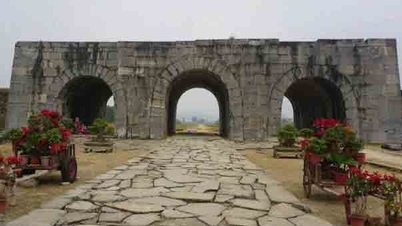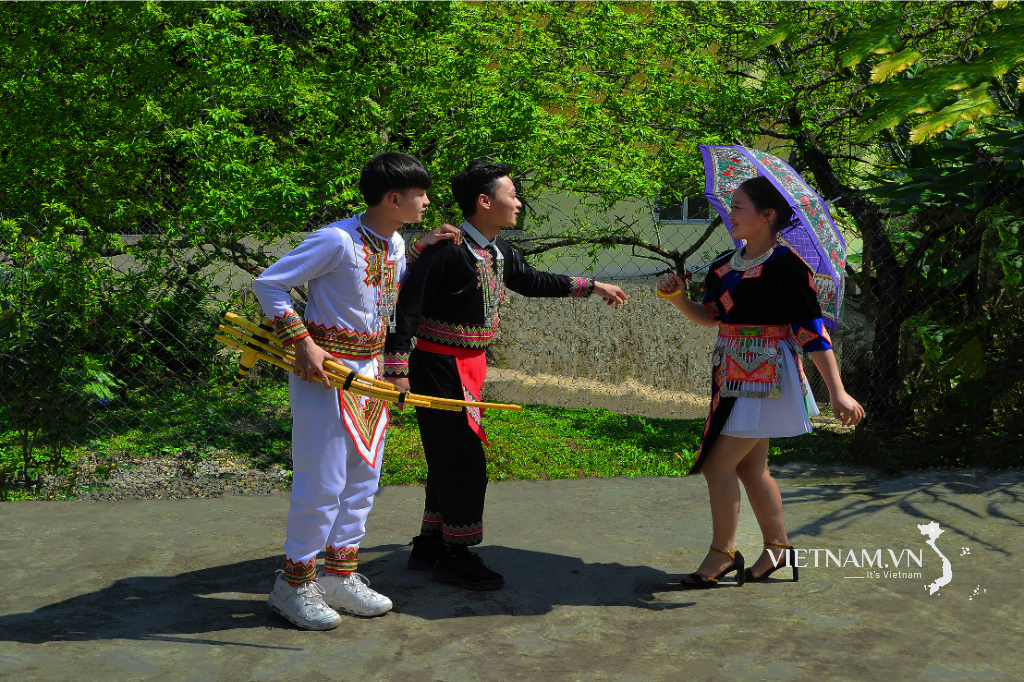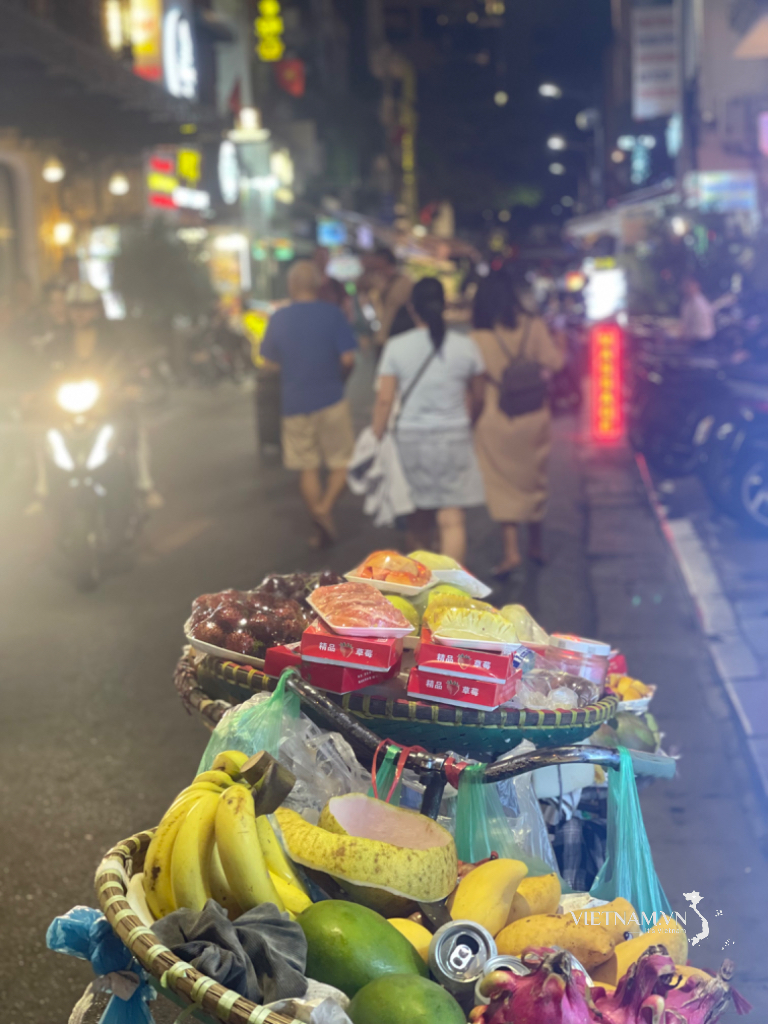In recent years, tourism management agencies and businesses in Khanh Hoa province have intensified the application of information technology in tourism activities. Initially, digital transformation in the tourism industry has brought some new experiences to tourists and facilitated tourism promotion. However, to form a digital transformation ecosystem in tourism activities, the tourism industry still has much work to do.
Outstanding applications
Upon arriving at the Ponagar Tower historical site, after passing through the ticket gate, many tourists use their smartphones to scan the QR code right by the walkway to access the automated audio guide introducing the complex, instead of relying on a tour guide. “This application is very useful, because not everyone has the opportunity to hire a tour guide, especially solo travelers. The audio guide is very clear and easy to understand… providing a lot of information about the time period and the distinctive architectural features of the Ponagar Tower complex,” said Ms. Nguyen Huong Lien (a tourist from Hanoi ). Using QR codes to access the Audio Guide (automated audio guide system) is the most noticeable new development in the digital transformation of tourism activities by the Provincial Center for Conservation of Historical Relics in recent times. Besides the Ponagar Tower, the center has implemented QR codes for visitors to access Audio Guides at many other historical sites and scenic spots, such as: Dien Khanh Ancient Citadel, Trinh Phong Temple (Dien Khanh), Hon Chong scenic spot (Nha Trang), Phu Cang communal house (Van Ninh)... The Ponagar Tower historical site also features VR360 virtual reality technology, allowing visitors to remotely explore via computer or smartphone.
 |
| Visitors scan the QR code to listen to the automated commentary at the Ponagar Tower historical site. |
Along with the Provincial Center for Heritage Conservation, tourism businesses in the province have implemented numerous digital transformation applications in their operations and management using specialized software systems, providing convenience, diversifying tourism services and products, and enhancing the visitor experience. Notably, Vinpearl Joint Stock Company has applied Face ID technology for check-in procedures for tourists. I-resort Nha Trang Hot Spring Resort has implemented an automated ticketing system to improve customer service efficiency. Each service includes a video and text summary. Customers can easily select the type of service and the number of tickets to purchase, then pay by scanning a QR code. In Bai Dai, Alma Resort has launched the Alma Resort mobile application with features such as: providing information on restaurant and bar menus, in-room dining services, and promotions; and integrating a function that allows users to provide feedback on the resort's services.
Synchronization is needed in digital transformation.
It can be said that digital transformation in tourism is an inevitable trend. However, due to difficulties in funding and personnel, most tourism businesses in Khanh Hoa have only implemented common applications such as websites and Facebook pages to promote and sell tourism products and services. Therefore, digital transformation in tourism activities remains inconsistent, resulting in low effectiveness. Most noticeably, the application of digital technology in tourism promotion and marketing in Khanh Hoa is slow, tourism promotion websites have not received adequate investment, and digital data on tourism activities remains fragmented. “Da Nang has a website, https://danangfantasticity.com (managed by the Da Nang Tourism Promotion Center), which helps businesses promote their tourism very well. Tourists only need to access this site to find almost complete information about Da Nang tourism… Meanwhile, Khanh Hoa tourism is developing just as well as Da Nang, but the website introducing tourism in Nha Trang - Khanh Hoa is still limited,” said Ms. Bao Chi, a tourist from Ho Chi Minh City.
Speaking with a reporter from Khanh Hoa Newspaper, Ms. Nguyen Thi Le Thanh, Director of the Department of Tourism, frankly acknowledged that despite many efforts, the digital transformation in the province's tourism activities still faces many limitations. To accelerate digital transformation, synchronized coordination among departments, agencies, and businesses involved in the tourism service supply chain is necessary. Since 2020, the Department of Tourism has advised the Provincial People's Committee to issue the Plan for the Application of Information Technology in Khanh Hoa's Tourism Activities until 2025. In this plan, the Department of Tourism will lead the implementation of many projects to promote the application of digital technology to support tourists before and after their trips; build digital tourism data, etc. Recently, the Provincial People's Committee approved the Project for a Tourist Information and Support Center. In the near future, the Department of Tourism will request the Department of Planning and Investment to advise the Provincial People's Committee on allocating funds and carrying out the steps to select contractors for the project. In addition, the Department of Tourism has submitted a document to the Provincial People's Committee for appraisal of the proposal for the investment in the Project to build a data warehouse system and professional software for the tourism industry; and for approval of the Project to build a virtual tour guide on mobile devices… Furthermore, according to the plan, in 2024, the Department of Tourism will implement the Project to build a digital tourism map of Khanh Hoa. “The digital tourism map will integrate tourist attractions, accommodations, shopping, entertainment, food, sports centers, hospitals, bus stations, airports… When completed, tourists can easily access information, directions, location, search, and filter locations on the map,” Ms. Thanh said.
According to tourism experts, digital transformation in tourism is an inevitable trend; therefore, it requires synchronization and coordination among key stakeholders in the tourism industry in the digital environment, including: management agencies, businesses involved in the tourism product supply chain, and tourists. Accordingly, the tourism industry needs to implement digital transformation in a unified and synchronized manner to optimize results, save resources, and strengthen linkages throughout the industry. To achieve this, in addition to the efforts of state management agencies, businesses in the tourism industry need to work together to accelerate digital transformation and contribute to sustainable tourism development.
THANH NGUYEN
Source












































































































Comment (0)